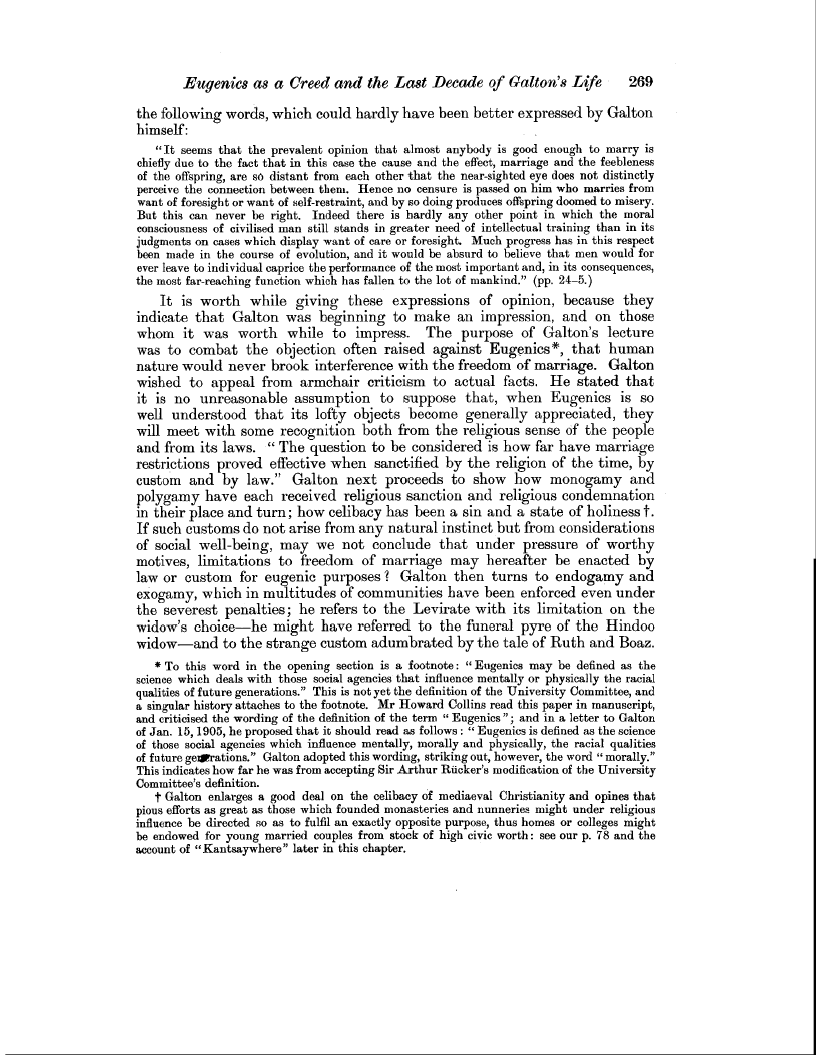| ||||||

OCR Rendition - approximate
Eugenics as a Creed and the Last Decade of Galton's Life 269 the following words, which could hardly have been better expressed by Galton himself "It seems that the prevalent opinion that almost anybody is good enough to marry is chiefly due to the fact that in this case the cause and the effect, marriage and the feebleness of the offspring, are so distant from each other that the near-sighted eye does not distinctly perceive the connection between then. Hence no censure is passed on him who marries from want of foresight or want of self-restraint, and by so doing produces offspring doomed to misery. But this can never be right. Indeed there is hardly any other point in which the moral consciousness of civilised man still stands in greater need of intellectual training than in its judgments on cases which display want of care or foresight. Much progress has in this respect been made in the course of evolution, and it would be absurd to believe that men would for ever leave to individual caprice the performance of the most important and, in its consequences, the most far-reaching function which has fallen to the lot of mankind." (pp. 24-5.) It is worth while giving these expressions of opinion, because they indicate that Galton was beginning to make an impression, and on those whom it was worth while to impress. The purpose of Galton's lecture was to combat the objection often raised against Eugenics*, that human nature would never brook interference with the freedom of marriage. Galton wished to appeal from armchair criticism to actual facts. He stated that it is no unreasonable assumption to suppose that, when Eugenics is so well understood that its lofty objects become generally appreciated, they will meet with some recognition both from the religious sense of the people and from its laws. The question to be considered is how far have marriage restrictions proved effective when sanctified by the religion of the time, by custom and by law." Galton next proceeds to show how monogamy and polygamy have each received religious sanction and religious condemnation in their place and turn; how celibacy has been a sin and a state of holiness t. If such customs do not arise from any natural instinct but from considerations of social well-being, may we not conclude that under pressure of worthy motives, limitations to freedom of marriage may hereafter be enacted by law or custom for eugenic purposes? Galton then turns to endogamy and exogamy, which in multitudes of communities have been enforced even under the severest penalties; he refers to the Levirate with its limitation on the widow's choice-he might have referred to the funeral pyre of the Hindoo widow-and to the strange custom adumbrated by the tale of Ruth and Boaz. * To this word in the opening section is a footnote : " Eugenics may be defined as the science which deals with those social agencies that influence mentally or physically the racial qualities of future generations." This is not yet the definition of the University Committee, and a singular history attaches to the footnote. Mr Howard Collins read this paper in manuscript, and criticised the wording of the definition of the term "Eugenics"; and in a letter to Galton of Jan. 15, 1905, he proposed that it should read as follows : " Eugenics is defined as the science of those social agencies which influence mentally, morally and physically, the racial qualities of future gentrations." Galton adopted this wording, striking out, however, the word " morally." This indicates how far he was from accepting Sir Arthur Rocker's modification of the University Committee's definition. t Galton enlarges a good deal on the celibacy of mediaeval Christianity and opines that pious efforts as great as those which founded monasteries and nunneries might under religious influence be directed so as to fulfil an exactly opposite purpose, thus homes or colleges might be endowed for young married couples from stock of high civic worth : see our p. 78 and the account of "Kantsaywhere" later in this chapter.
|